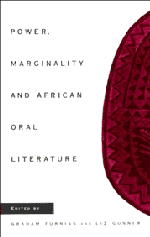Book contents
- Frontmatter
- Contents
- List of contributors
- Preface
- Note on transcription
- 1 Introduction: power, marginality and oral literature
- Part I Orality and the power of the state
- 2 Oral art and contemporary cultural nationalism
- 3 The letter and the law: the politics of orality and literacy in the chiefdoms of the northern Transvaal
- 4 A king is not above insult: the politics of good governance in Nzema avudwene festival songs
- Part II Representing power relations
- Part III Oral forms and the dynamics of power
- Part IV Endorsing or subverting the paradigms: women and oral forms
- Part V Mediators and communicative strategies
- Bibliography
- Index
2 - Oral art and contemporary cultural nationalism
Published online by Cambridge University Press: 18 December 2009
- Frontmatter
- Contents
- List of contributors
- Preface
- Note on transcription
- 1 Introduction: power, marginality and oral literature
- Part I Orality and the power of the state
- 2 Oral art and contemporary cultural nationalism
- 3 The letter and the law: the politics of orality and literacy in the chiefdoms of the northern Transvaal
- 4 A king is not above insult: the politics of good governance in Nzema avudwene festival songs
- Part II Representing power relations
- Part III Oral forms and the dynamics of power
- Part IV Endorsing or subverting the paradigms: women and oral forms
- Part V Mediators and communicative strategies
- Bibliography
- Index
Summary
History has witnessed many contrasts in the role of oral art in Africa. Oral art, which here refers to all artistic forms orally presented to an audience, often exalts, but also castigates rulers. Oral art may exhort people to demonstrate strength, courage and prowess and yet lull others into humility and silence before dominant powers. Examples are plentiful of oral art which became part of the colonising process in praising the colonisers and also of oral art as a tool of the anti-colonial struggles.
The status of oral art in Africa has been no less variable. From a prestigious status as a mechanism for criticising rulers, and for producing pedagogues and custodians of community values, knowledge and history, oral art was denied a place in world civilisation during the dark era of colonialism and foreign domination (Thiongo 1986; Fanon 1967). The neo-colonial character of post-independence Africa has meant that the situation in contemporary times has changed little, despite the frequent appearance of oral art performances at state banquets or state visits.
Cultural nationalism, which here refers to a sense of national cultural unity and identity, suggests the overcoming of some of these contradictions. Cultural nationalism was an inseparable companion of the political nationalism of post-independence Africa seeking to free the newly independent states from the humiliation of belonging to colonial empires.
- Type
- Chapter
- Information
- Power, Marginality and African Oral Literature , pp. 23 - 34Publisher: Cambridge University PressPrint publication year: 1995
- 4
- Cited by

